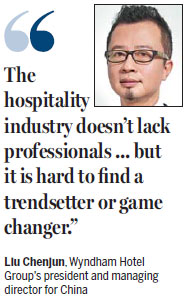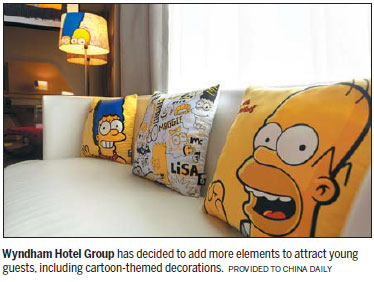Wyndham Hotel senior executive takes risks to disrupt market
Group's president for China is on a mission to engage millennials in the hospitality industry
By partnering with a consumer drone maker and setting up themed rooms, Liu Chenjun, Wyndham Hotel Group's president and managing director for China, is hoping to engage millennials in a way that could become a game changer for the whole industry.
"The hospitality industry has been too quiet for the past few decades," said Liu, who is now managing a portfolio of 11 brands and close to 1,400 hotels in China. "I want to be a disrupter and stir up some changes by crossing over with some unlikely but fitting partners."
Founded in 1981 and headquartered in New Jersey, the world's largest hotel company by room number last year saw upwards of 250 new WGH hotels throwing their doors open on the Chinese mainland.

While the pace of nationwide expansion is unlikely to slow down over the coming year, if not accelerate, Liu, a former diplomat, wants to help hotel owners to sell rooms in a different manner.
"There is no point in telling the brand stories of each of our 19 brands (eight have yet to be introduced to China). Young people today won't listen to it," Liu said in an interview after the group's annual forum in late June. The event gathers thousands of hoteliers, investors and managers in the industry.
"We want to create a conversation with millennials, talking with them in a language that they appreciate and finding out what they want," he said.
Consulting firm Agility Research& Strategy found that millennials in Asia make an average of 4.2 leisure trips every year, ranking highest among all age groups. Social media research drives 62 percent of the generation's destination decisions and 75 percent post about their trip online at least once while traveling.
The new "language" Liu has adopted aims to inspire social media-addicted millennials to take pictures and share them online.
In 2014, months after he was appointed the helmsman of the group, Liu and his team organized a gala, inviting more than 40 domestic celebrities to Beijing's Imperial Ancestor's Temple, a historical site dating back to 1420. The grandest publicity stunt in the hotel industry in China by far, the event secured more than 170 million online views within seven months and is believed to have increased the group's brand awareness by 30 percent.
"That's the crossover 1.0 version, to let more Chinese know about Wyndham. Today, we have moved into the next version, to get people to stay at Wyndham," Liu said.
There are no concrete plans for how many of the group's hundreds of thousands of rooms will be re-decorated with themes such as the Simpsons, or other cartoon features licensed by China Brands Group, the country's major intellectual property management and licensing agency.
Liu said it would be a decision left to owners of each individual property whether to have cartoon-themed rooms or not. A majority of the group's hotels in China are franchised.
Drones provided by domestic company Power Vision will be offered primarily at hotels along the country's coastal area, so that guests can use them for water sports.
"It's not only about attracting young guests to our hotels, but also adding value to what each property can offer as a winning competitive edge in this ever-fiercer market," Liu said.
The Beijing native left for France early in the 1990s a few years after working as a diplomat as he did not want his life to become predictable.
Having spent more than one decade at the headquarters of French hospitality group Accor, he returned to China and joined Costa Crociere in 2008 - the first cruise company to enter the mainland.
"The hospitality industry doesn't lack professionals. It is good at taking care of people from head to toe, day to dawn, but it is hard to find a trendsetter or game changer," he said. "Over the past three decades in China, there have been few changes except that every international brand has come here and set up an outlet, if not two or more."
"I think I am a born disrupter and willing to take risks, like with the Simpsons," he responded at his office in Shanghai, where bright yellow graffiti depicting the fictional characters dominate the main wall.
xujunqian@chinadaily.com.cn


(China Daily 08/05/2017 page10)














